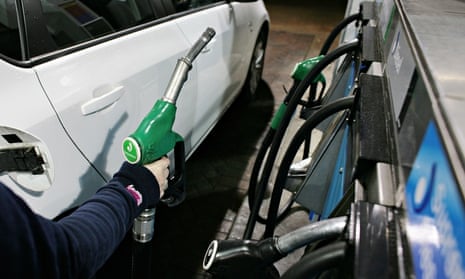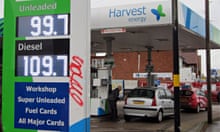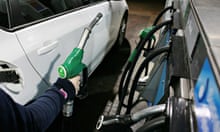Britain’s motorists are now benefiting from a fresh outbreak of supermarket petrol price wars after the price of oil slumped to a fresh six-year low on the world’s commodity markets.
Tesco, Asda, Sainsbury’s and Morrisons all announced that they were shaving two pence a litre off the price of petrol and diesel as a 5% decline in the cost of crude on Monday took a barrel of benchmark Brent crude to below $48 a barrel.
After more than halving since its recent peak of $115 a barrel last summer, the latest decline in the cost of oil was prompted by the investment bank Goldman Sachs cutting its short-term price forecasts and silence from the big producers in the Middle East on possible production curbs.
Tesco led the way in the latest bout of price cutting on garage forecourts, with its cut to 103.9p a litre for petrol coming into force on Monday afternoon. The three other supermarkets said they would follow suit from Tuesday.
The move takes petrol prices within touching distance of the pound a litre level, with one garage in Birmingham offering petrol at 99.7p a litre on Monday.
Meanwhile, shares in two of the UK’s leading energy companies fell sharply on Monday after the Labour leader Ed Miliband promised extra powers for the industry’s regulator Ofgem to force firms to pass on lower wholesale oil and gas prices to their customers.
Shares in SSE fell by as much as 6%, knocking nearly £1bn off its value, while Centrica was down by nearly 4% during the session, cutting nearly £500m from its market value.
Analysts at Goldman Sachs cut their three-month forecasts for Brent to $42 a barrel from $80 a barrel.
The bank believes that the sharp fall in the cost of oil will lead to a reduction in exploration and production in the hitherto buregeoning US shale sector, with Brent rebounding from a trough in the second quarter of 2015 to $64.5 a barrel by the fourth quarter. But it added that it would take time to bring demand and supply back into balance.
“To keep all capital sidelined and curtail investment in shale until the market has rebalanced, we believe prices need to stay lower for longer,” the analysts said.
As Opec’s November decision not to curtail production in the face of falling prices piles pressure on some group members, Venezuelan president Nicolas Maduro met Saudi Arabia’s Crown Prince Salman in Riyadh on Sunday as part of a diplomatic tour in the Gulf to discuss falling oil prices.
However, Saudi Arabia, the world’s biggest oil exporter, has said it will not support prices by cutting production even if the price falls as low as $20 a barrel and ignored calls from smaller Opec members, including Venezuela, to react to falling oil prices at the cartel’s November meeting.
The RAC, which has been forecasting that petrol prices would dip below £1 a litre mark, welcomed the news of the Birmingham service station price cut.
But the AA said that, although welcome, the Birmingham reduction “appears to be a publicity stunt rather than a reflection of general pump prices”.
AA president Edmund King said: “It will still take some time to get down to an average of £1 per litre, particularly as 70% of the pump price is tax (57.95p duty and 18.3p VAT).
Since peaking at just under 132p a litre last summer, petrol prices have fallen by more than 20%. Analysts believe the reduced cost of filling up a car with fuel will act like a tax cut, boosting real incomes and discretionary consumer spending.





Comments (…)
Sign in or create your Guardian account to join the discussion